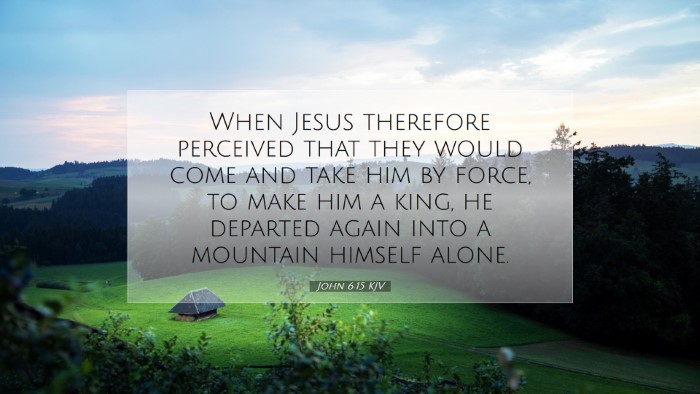Commentary on John 6:15
John 6:15 states: "When Jesus therefore perceived that they would come and take him by force, to make him a king, he departed again into a mountain himself alone."
Contextual Overview
The passage occurs immediately after the miracle of the feeding of the five thousand, where Jesus demonstrated His power and provision. This miracle significantly impacted the crowd's perception of Jesus, leading them to consider Him a potential king who could liberate them from Roman oppression.
Commentary Contributions
Matthew Henry's Commentary
Henry offers a detailed examination of the crowd's intentions. He interprets their desire to forcibly make Jesus king as a misalignment of their expectations of His mission. While they sought a political Messiah to reign over them, Jesus recognized the temporal nature of their aspirations and opted to withdraw from any such coronation.
- Misunderstanding of Jesus’ Role: Henry highlights that the crowd’s desire for an earthly king stems from a misunderstanding of Jesus’ mission. Instead of delivering them from Roman rule, His plan was to lead them to spiritual freedom.
- Jesus’ Response: His withdrawal illustrates that He was not seeking worldly authority but was focused on fulfilling God’s redemptive plan, which ultimately involved His suffering and sacrifice.
Albert Barnes’ Commentary
Barnes emphasizes the significance of the word "perceived," which indicates Jesus’ deep understanding of human nature and the motives driving the crowd. He notes that this insight led Him to retreat to protect His ministry from premature political entanglements.
- Spiritual Leadership: Barnes asserts that Jesus sought to establish a kingdom not characterized by earthly power but founded upon spiritual truths and the transformation of hearts.
- Symbolism of the Mountain: His retreat to the mountain symbolizes a deep connection with the Father and highlights the importance of seeking divine guidance amidst human adulation and misunderstanding.
Adam Clarke's Commentary
Clarke provides a theological insight into the tension between Christ’s divine mission and the crowd's temporal desires. He comments on the nature of Christ’s kingdom as one that is "not of this world," reiterating that Jesus came to reclaim humanity through love and sacrifice rather than force.
- Desire for a Political Kingdom: Clarke points out that the crowd’s desire for a Messiah who would lead a political revolution was misguided, indicating a lack of true understanding of Jesus’ identity and purpose.
- The Solitude of Jesus: His retreat into the mountain signifies the need for solitude and prayer, reflecting Jesus’ own reliance on the Father’s strength and direction amidst the pressures of popular opinion.
Theological Reflection
The dynamics presented in John 6:15 prompt a reflection on the nature of true discipleship. Believers are often tempted to mold Jesus into their own expectations and desires. This passage serves as a reminder that Jesus transcends worldly systems and expectations.
- Recognizing Jesus’ Sovereignty: Disciples are called to recognize the Lordship of Christ in every aspect of life, forsaking any desire to manipulate or coerce His will to align with human ambitions.
- Spiritual rather than Political Kingdom: Like the crowd, modern believers must be wary of conflating Christ's truth with political ideologies, ensuring that their pursuit of the kingdom aligns with His teachings.
Practical Application
This passage encourages the church today to reflect on the nature of leadership and the role of the believer in society. It is vital to embody the values of Christ’s kingdom in a world preoccupied with power and success.
- Prayer and Solitude: Just as Jesus withdrew to pray, believers should prioritize time alone with God, seeking His direction and strength before engaging with the demands of the world.
- True Discipleship: Followers of Christ must continually evaluate their motives, ensuring that their pursuit of Jesus is rooted in the desire for spiritual closeness rather than temporal gains.
Conclusion
John 6:15 presents a profound moment of tension between human expectations and divine purpose. Through the insights provided by Matthew Henry, Albert Barnes, and Adam Clarke, one can see that Christ’s kingdom transcends worldly ambitions and focuses on restoring humanity to a right relationship with God. The challenge for today’s believer is to pursue this higher calling, cultivating a heart aligned with Jesus’ true mission.


